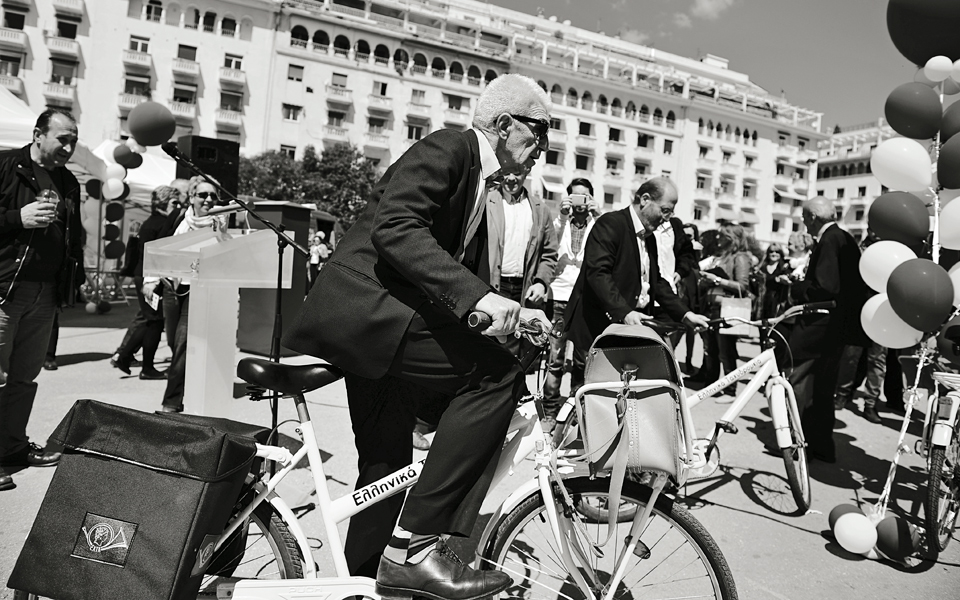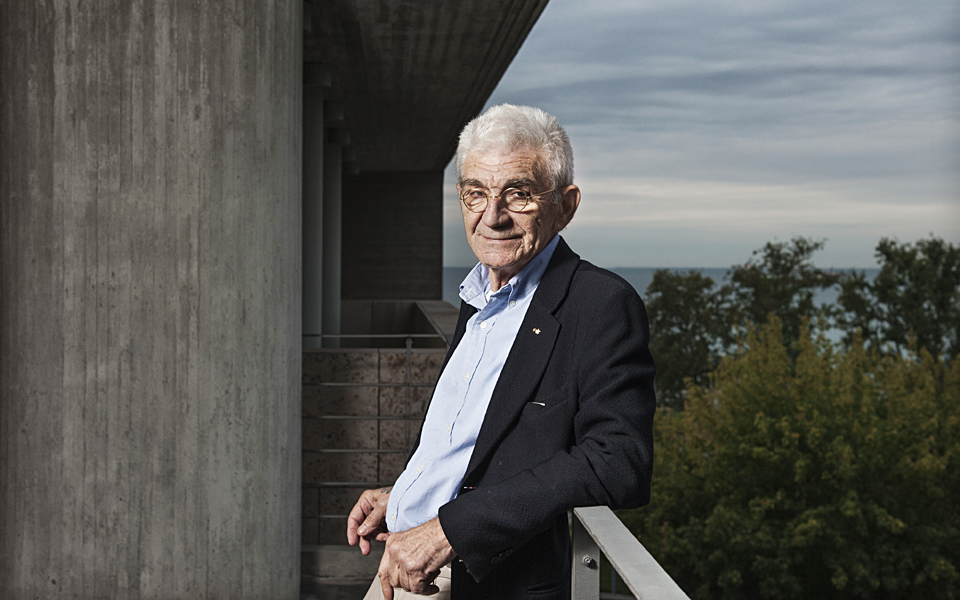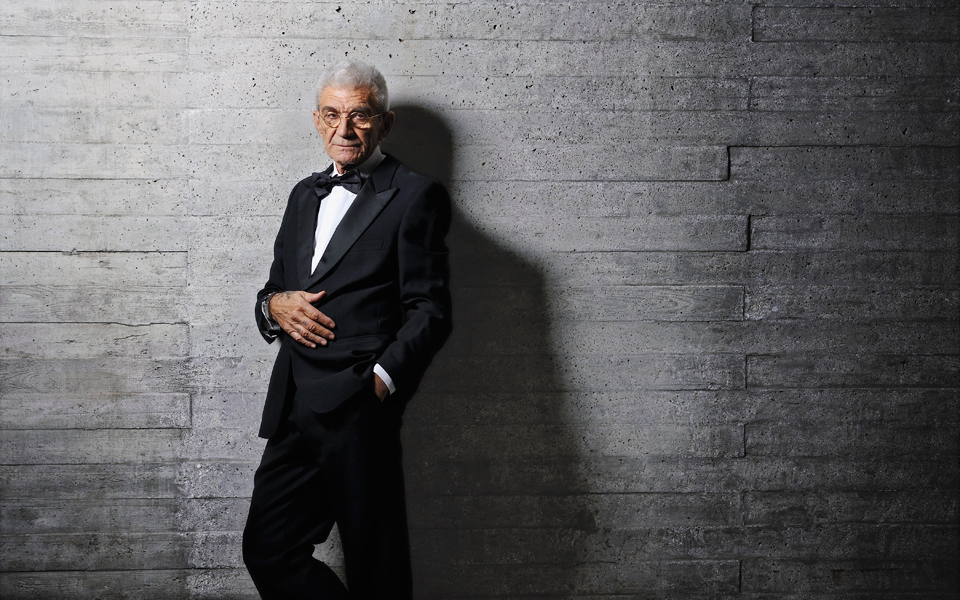Yiannis Boutaris was named Mayor of the Month in October 2012, joining the likes of London’s Boris Johnson and New York’s Michael Bloomberg. The UK-based City Mayors Foundation said that if all Greek politicians were like Thessaloniki’s mayor, Greece wouldn’t be in the mess it’s in. Similar views were voiced by the International Monetary Fund, which praised him for his reformist zeal, and foreign media who dubbed him a beacon of hope for the country.
Boutaris insists that he is not a politician, just a businessman who passed his family’s winery on to the next generation to take on a new project: running Thessaloniki. Born into the oldest wine-growing family in Greece, he was instrumental in bringing Greek wine to the world. A scholar of the city’s history and an art aficionado, he co-founded the Macedonian Center of Contemporary Art and throws his support behind all manner of cultural activities. He is also involved in grassroots movements to improve life in the city and was a pioneer in environmental activism, earning the title of “European Hero” by Time magazine in 2003.
The truth is that the “tattooed mayor,” as he was recently dubbed by The Guardian, is not your ordinary politician. Even at the age of 73 he is more rock star than suit. He has been open about his battle with alcohol addiction, wears John Lennon-style glasses, has seven tattoos and sports a diamond stud in one ear. He smokes roll-up cigarettes and is always dressed in signature suspenders, checkered or striped shirts, jeans and a corduroy jacket. He eschews all the habits of a public official. He does not go around with an entourage, doesn’t drive a state car and unlike most Greek politicians, does not hide from his electorate.
Boutaris is not afraid to rock the boat. Just days after he was elected for the first of two terms, he confronted the influential metropolitan bishop of Thessaloniki, asked Berlin for advice on waste management at a time when relations between Greece and Germany were especially fraught, and visited Istanbul in a bid to drum up Turks’ interest in visiting Thessaloniki. He challenged the city’s conservative impulses by posing nude for an AIDS campaign and openly supporting Gay Pride – on the day of the parade, a large chunk of the populace attended church services protesting the event.
Boutaris’ nonconformist stance may have raised eyebrows but no one doubts that within the first two years of his tenure, he spoke openly about corruption, tidied up municipal finances and transformed Thessaloniki into an international destination. A city that once catered exclusively to business travelers and passing tourists saw arrivals in 2011-2013 from Russia skyrocket by 371 percent, from Israel 358 percent and from Turkey by 226 percent. Proof of his success was Thessaloniki’s ranking among the top international destinations in 2013 by National Geographic.

© Corbis/Smart Magna
You’ve said that you can’t get to know Thessaloniki unless you muddy your shoes. What did you mean?
That you need to walk a lot to enjoy it. Head up to Ano Poli to see the 10th century churches and monuments, and sniff out the cafes and tavernas that aren’t in any guide book. Walk down to the historical center with its open-air farmers’ markets and the aroma of a bygone era – still present amid the smell of clothes and shoes arriving in bulk from China. Take a stroll by the sea, along the coastal promenade from the port to Thessaloniki Concert Hall.
What were the key historical events that shaped the city?
The city was devastated by a terrible fire in 1917 that engulfed the entire center, together with all the commercial activity run by the Jews. A plan for its restoration was never put into effect and so the big village with its eastern feel and narrow streets – which is what Thessaloniki was at the time – never became the European-style city envisaged by French urban planner Ernest Hébrard, whose vision was confined to Aristotelous square and street. Next came the doubling of the city’s residents with the population exchanges of 1922 and the annihilation of its Jewish community in the Holocaust. So, from a cosmopolitan city that had acquired European characteristics, a crossroads between East and West, outward-looking and with a plethora of foreign diplomatic missions, companies and banks, it became a city of refugees.
How would you define Thessaloniki today?
It is in search of an identity. I wouldn’t call it a classically European city nor does it have the air of the East. I believe it is a medley that is alluring. It is home to more than 120,000 students and is seeing the emergence of young entrepreneurs as well as citizens’ groups volunteering their services in many different areas, and this gives us hope because active citizens are the ones who ultimately shape developments.
Why would someone choose Thessaloniki over Athens for a city break?
If someone is planning to spend five days in one or the other, the simple truth is they’ll have more fun in Thessaloniki. The Acropolis and its museum may be unrivaled, but all the cultural activities available in Athens are also available here on a smaller scale: from the Byzantine and Archaeological museums – the city has 33 vibrant museums – to the Costakis Collection of Avant-Garde Russian art at the State Museum of Contemporary Art and the Iolas Collection at the Macedonian Museum of Contemporary Art. The same goes for the commercial center: the cafés, restaurants and clubs are clustered together in a few blocks. And if you want to escape the urban setting, just an hour’s drive away you will find spots of incredible natural beauty: From a boat ride on the Axios Delta to climbing Mt Olympus, bird-watching at Lake Kerkini and hundreds of beautiful beaches, all the way from Halkidiki to the coast of Pieria.
Do Thessalonians embrace their visitors?
Just the other day I was at a restaurant, talking with the owner and I asked him why someone would visit the city. He said because we will show them a good time. It’s not easy to explain, but in general terms it means that you’ll be in a good mood from the moment you step out of your hotel. You’ll say five ‘good mornings,’ see someone you met the day before and be greeted with the warmth of a friend.
Boutaris does not go around with an entourage, doesn’t drive a state car and unlike most Greek politicians, does not hide from his electorate.

Where do the young artists and entrepreneurs live?
Frangomahalas is a neighborhood with a lot of young residents. Two- and three-story early-19th-century buildings that once served as residences, then as large workshops before being abandoned with the demise of industry, are now coming back to life. They are being turned into small business premises for architects, engineers or innovative graphic arts and design firms, or transformed once more into homes. This is where the first boutique hotels are emerging and where the nightlife is concentrated. The mornings are mostly given over to commerce, with the activity centered on the food and spice shops, but come noon, the young people who work, live and hang out here start making their appearance.
What is the latest trend?
Bicycles. We’re not quite Copenhagen but there has been a notable increase. We’re trying to restore the bicycle lanes that had been designated at one point, build a new network and boost the presence of shared bikes.
The numbers show that Thessaloniki is experiencing a tourism boom despite the crisis. To what do you attribute this enviable rise?
From the outset we tried to promote the city’s rich multicultural history and cultural heritage, with an emphasis on the Ottoman and Jewish past, which had been considered taboo. Our reasoning is that a city needs to know its own history before it can move ahead into the future. Overtures to Turkey and Israel, particularly the Jewish diaspora, resulted in a rise in tourism. We also engaged in a form of city diplomacy by forging ties with other metropolises in Greece, Europe and the rest of the world through, for example, the European Youth Capital initiative in 2014 and the Rockefeller Center’s network of 100 Resilient Cities, to which we were accepted later that same year. Our drive to make Thessaloniki more outward-looking was also coupled with efforts to host major international events such as the 2011 Biennale of Young Artists from Europe and the Mediterranean, the 2012 World Music Expo, the 2013 International Maxibasketball Championship for veteran players, the 2014 World Rowing Coastal Championships, etc.
How do you intend to enhance the traveler’s experience over the next five years?
Thessaloniki needs to solve its traffic problem, particularly through public transport because right now we only have buses as the metro is still under construction. We are pushing for better transportation along the coast and a tram network, but also trying to restrict traffic in the city center, which is why we’re constantly creating smaller and larger pedestrian zones – Aghias Sofias, which was recently pedestrianized is a good example. In the area of waste management, we want to increase recycling, reuse and composting, and reduce the number of bins on the streets, something that would definitely boost the city’s image. We are also going ahead with a plan to run all power cables underground, starting in the historic center.
You are Thessaloniki-born and bred, and spend a lot of time all over the city. Does is still hold surprises?
The other day, leaving City Hall and walking along the coast, I saw seven or eight couples dancing swing and suddenly felt as though I was on a film set. Further down another group was dancing Latin. And then there are the street drum bands that perform for no apparent reason. The city’s energy, despite unemployment of 30 percent, never ceases to amaze me.
Proof of Boutaris’ success was Thessaloniki’s ranking among the top international destinations in 2013 by National Geographic.











